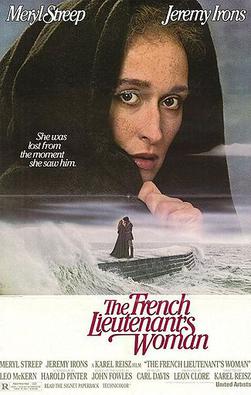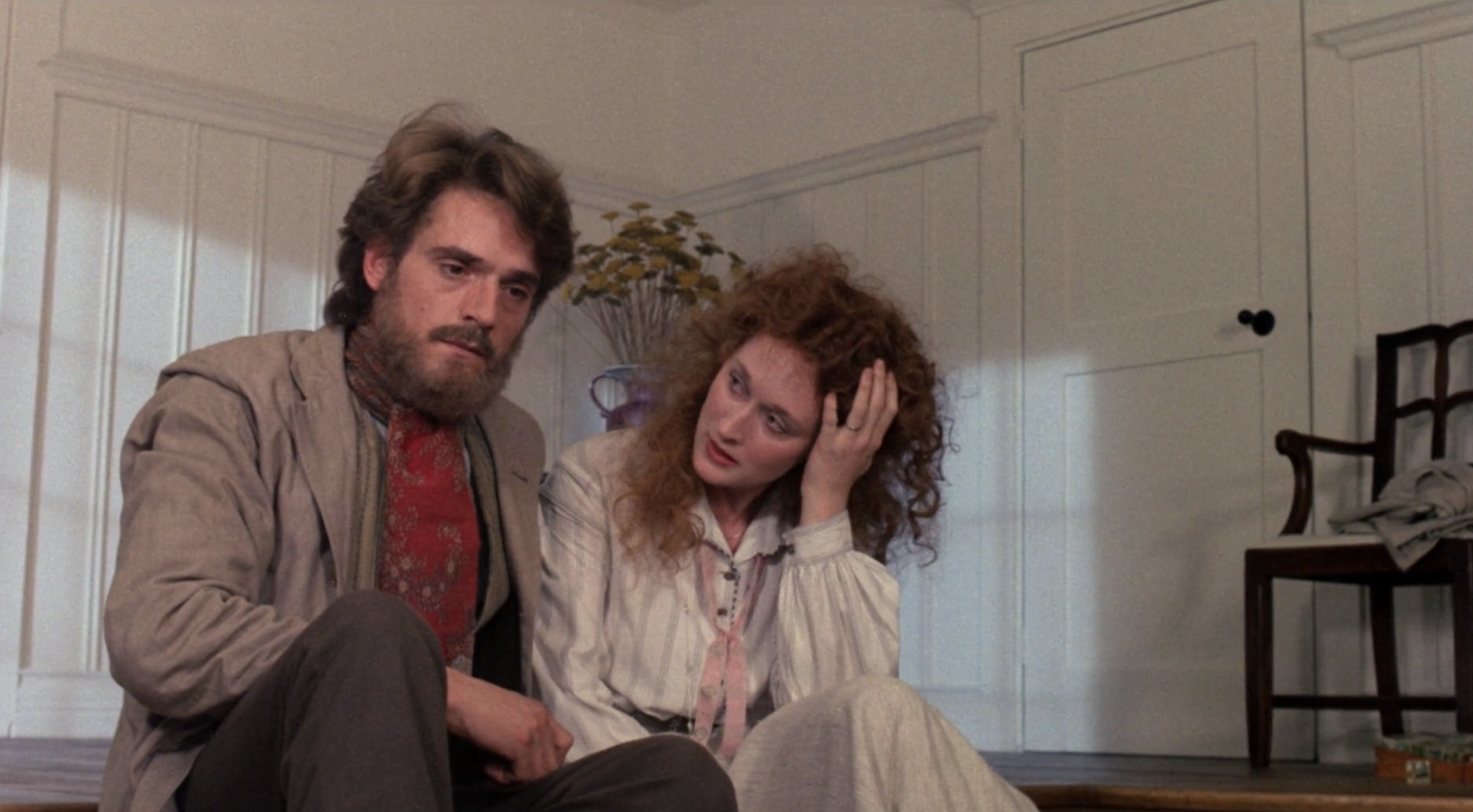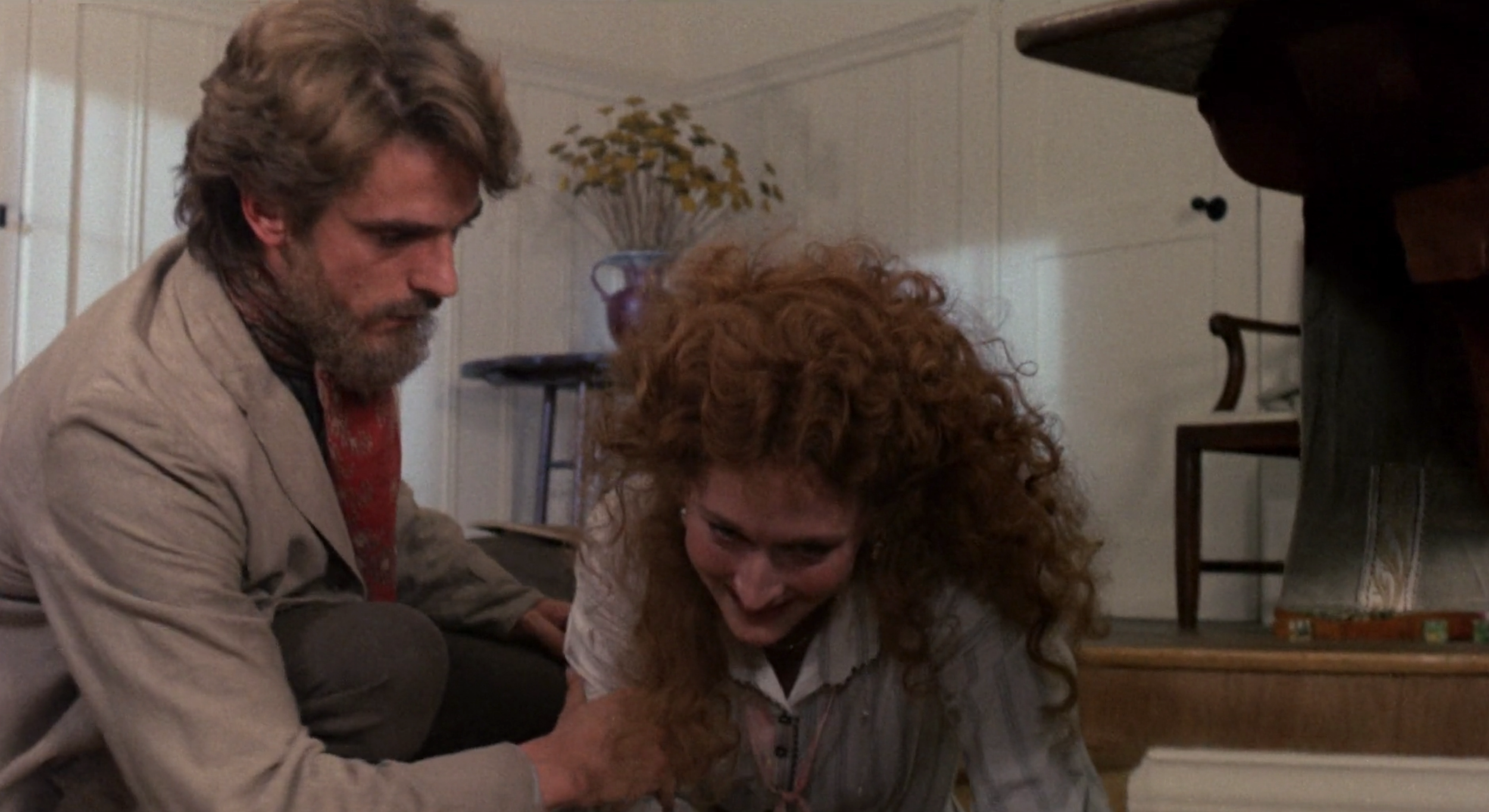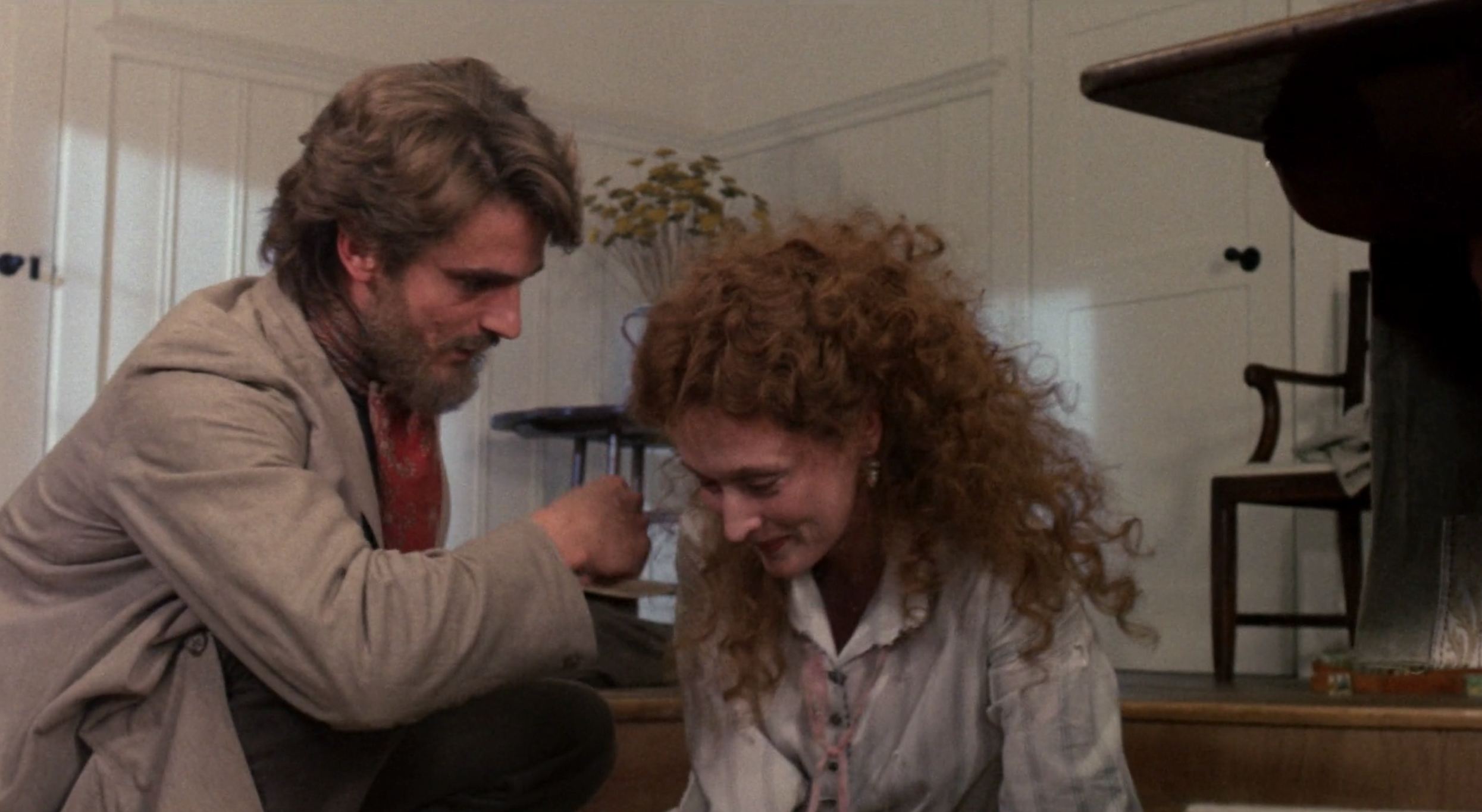In Defense of Streep's first Best Actress nomination
 Sunday, May 10, 2020 at 7:39PM
Sunday, May 10, 2020 at 7:39PM Before we close the book on our big 1981 event we thought we'd discuss a few of the leading ladies of the year. Please welcome guest contributor Gabriel Mayora !

In 1981, Meryl Streep was a breakout star, a buzzy and reputable theater actress who in only four years since making the transition from Broadway to Hollywood had garnered an Emmy for a hit miniseries and two back-to-back Best Supporting Actress Oscar nominations in ’78 and ’79 (both for Best Picture winners), winning the second time. It was time for her to turn into a full-fledged leading lady. Enter Karel Reisz’s The French Lieutenant’s Woman, the film that marks Streep’s first Best Actress nomination. Over the decades, this performance has gained a reputation for belonging in the “overrated” category. Was this nomination more of a symbolic gesture to solidify her status as Hollywood’s new leading star or appreciation of the performance itself?
A key scene in the last 10 minutes of the movie makes a convincing argument for why voters would have felt genuinely compelled to single out Streep’s dual turn among the top five lead performances of 1981...
The French Lieutenant’s Woman is a cinematic adaptation of the 1969 novel by John Fowles, a postmodern—and deeply literary—deconstruction of the tragic, destitute heroine figure reflective of the moralistic representation of independent women in classic Victorian fiction. Fowles’ conceit consists of disrupting the novel’s plot to provide his own commentary. In adapting the novel for the screen, famed playwright Harold Pinter’s screenplay reimagines the source material’s main narrative as a film-within-a-film about the socially reprehensible love affair between the mysterious outcast Sarah (Meryl Streep) and Charles (Jeremy Irons), the high-society man who becomes infatuated with her. Pinter then adds a parallel framestory about the two lead actors, Anna and Mike, who have a run-of-the-mill affair while shooting the film on location.
Streep’s performance is a balancing act that calls for her to play the role of Sarah as performed by Anna, an actress who spends her time offset researching her character and running lines with the costar with whom she is having an illicit, yet dull, affair. And if this balancing act is more successful in some scenes than others, it more than pays off at the end of the movie in a single scene where Streep manages to bring the entire performance together, raising the quality and rewatch value of the film along the way.

Set three years after Sarah disappears without notice, the scene begins with Irons’ Charles arriving at a house by the seaside where he finds the formerly destitute Sarah. Charles angrily accuses Sarah of ruining his life as she pleads for him to understand that she could only be his partner once she found the sense of independence she now enjoys (it is hard not to think of Joanna Kramer when listening to Streep’s Sarah explain the importance of a woman becoming fully realized before she can tend to the demands of romance or domesticity). When Charles heads toward the door to leave Sarah behind for good, she grabs his arm to stop him, but he pushes her away. Sarah falls and hits her head against a wooden table. When she tries to get up, she slips once again.
What happens next is one of the great acting moments of Streep’s career. Upon the second fall, Streep, facing the camera, lets out a sly smile that transforms into a gentle giggle. For the first time in the film-within-the-film, Anna breaks character, and it is phenomenal. When Irons’ character rushes to help her, the two share a laugh. Anna pauses for a moment, looks into Mike’s concerned eyes and without a single word reassures him that she is okay to continue the scene. And they do.

Pinter’s screenplay feebly attempts to draw parallels between Sarah and Anna throughout the entire film. Yet, it is Streep who, through an inspired choice, finally forges a connection between these two women. Even more impressive is the way Streep uses this moment of spontaneity—the subtle smile, the soft laughter, the look into Irons’ eyes that says “I’m okay, let’s keep going”—to signal her seamless transformation from Sarah to Anna. After this brief moment, the actress (Streep but also Anna) remains committed to finishing the scene, fixing a few strands of hair on her wig and rubbing the side of her head, but flawlessly delivering Sarah’s last few lines of dialogue.
The shift we see in the middle of this scene incites a disruption more truthful to Fowles’ prose than Pinter or Railz are able to realize elsewhere in the movie. For Streep, this acting choice becomes an essential tool to show us a side of Anna we have not yet seen—a vulnerability, awkwardness, and humor that both grounds and deepens the character. Even the silent exchange between Mike and Anna tells us more about their relationship than any dialogue scene that came before.

In a 2015 documentary about the making of The French Lieutenant’s Woman produced for the film’s well-deserved addition to the Criterion collection, Meryl Streep mentions how Mike Nichols—the auteur with whom she is most associated and who directed some of her finest work—told her he knew he wanted to work with her as soon as he saw this scene. It is the kind of acting choice that signals the arrival of a new leading star, one whose intellectual approach to acting is as equally matched by her surprising spontaneity and her ability to bring an entire film together in a single moment.
More from our 1981 retrospective
- The 1981 Supporting Actress Smackdown
- Katharine Hepburn's fourth Oscar
- Kathleen Turner's sizzling debut in Body Heat
- Harrison Ford in Raiders of the Lost Ark
- Jessica Harper in Pennies From Heaven
- Marilia Pera in Pixote
- Only When I Laugh and the Razzies
- Kathryn Harrold in Modern Romance
- Vintage: Pop Culture in 1981
- Vintage: Sexiest People Born in 1981



Reader Comments (26)
Great read, though I do find this performance to be a bit of a misfire and I think Streep herself does as well?
What a strong debut, Gabriel! Great piece.
I do wish Mr. Mayora had included his perspective on Streep’s remarks on The Graham Norton Show stating the actress felt her performance had not “imbued the angel of insipiration.”
Meryl was more deserving of the Oscar than Katherine Hepburn. "The loons the loons"
Was a tough screenplay but an iconic movie poster. I do love the mysteriousness of Streep's character, Sarah.
Is it really maligned though? I just think it's forgotten.
I thin Streep is great, lifts up her whole movies' spirits. It's a decent nomination for her but still ranks among her less impressive nominated turns. Not on par with the flat out undeserving nominations (Into the Woods, Music of the Heart) but still bottom of the pack.
As much as I like her in it I'm thankful she didn't win, and she probably got pretty close to it too.
This is one of my favourite movies of 1981 and, in terms of the nominees, Streep's performance is second to Marsha Mason's in terms of who I would have voted for. Based on (a.) discussions around the Smackdown, and (b) this article, I am starting to feel as if I am definitely in the minority!
(Surely all the detractors can at least admit that both Mason and Streep were streets ahead, in terms of quality, than the winner for that year, Katherine Hepburn?)
Love this peace I think it sum up Meryl's tremendous gift ... I found her incapable of making even the worst of movie (House of Spirits comes to mind ...) without at least one brilliant moment (House of Spirits again that scene were Irons push her on the wall) ...
I don't think it's a failed performance but I wasn't bowled over by it or the film. I felt much better about that later when Meryl herself commented that she wasn't fond of her work in the film either.
I think this is one of her very best movies and the nomination was entirely well-deserved. Also, can we just say how hot Jeremy Irons is in this film?
I saw this with a friend in 1981 and we were bowled over by Streep. Although her rise in film was rapid, she was still on the rise and I found her performance at the time excellent.
I haven’t watched this in over ten years but I remember liking her performance. I’m surprised it’s so hated. I guess I should rewatch it.
She’s definitely the weakest of the nominees in 1981. The lineup should’ve been:
Mason
Keaton
Hepburn
Sarandon
Kathleen Turner
Mason should’ve won.
She’s definitely the weakest of the nominees in 1981. The lineup should’ve been:
Mason
Keaton
Hepburn
Sarandon
Kathleen Turner
Mason should’ve won.
Great post! This is one of my favourite Streep performances/film right after the holy trinity of The Hours, Madison County and Prada. I really don't understand why many think it's one of her minor efforts.
I should revisit the film. I watched it in my teens, during my very intense Meryl phase, and was probably too young to totally enjoy its full potential.
On a related note, someone should tackle Isabelle Adjani's 1981 performance in Possession, which is also both controversial and iconic and which marked the beginning of her reign as the Supreme Queen of the Césars (5 as Best actress).
Great write up,we all know she doesn't like this performance and as from the comments some agree some don't,It's the modern stuff that jars for me,I like the period role more but at times it's more about the visuals than her.
I would have put Lange in her place for The Postman Always Rings Twice,a turn of hers not discussed very much and it's the role that changed her career forever,would Lange have been the Lange we know now without critics praising her in 81 and directors taking notice.
It's a great Meryl Streep performance exactly because no one else could do it right.
Great piece but I still consider the performance (and film) a disaster.
When they finally consummate their relationship and Charles climaxes after, what?, ten seconds tops, Streep/Sarah's reaction is really something to behold.
I think she may have come in second that year (she won the Globe, after all). Would've been quite something if she had given that she probably would've won again the next year for Sophie.
What an interesting read, well done. I haven't seen this in decades, when it first came out I believe we were overly impressed by it. But I was really infuriated that Hepburn was nominated for "On Golden Pond" - that was an awful performance.
Was this the year Kathleen Turner did "Body Heat"? Because I was knocked sideways by that performance.
markgordonuk--Lange is remarkable and I agree that this was the turning point for her career, and it made the extraordinary next year she had possible. She would be my No. 6 that year. Dunaway would be No. 7, and Streep might be No. 8, but I'd have to ponder that some more.
It is exciting that people feel strongly about this performance and nomination, one way or the other. It is why I wanted to write about it and read others' thoughts. I remember watching it for the first time as a sophomore or junior in college and being blown away by the notion of a period movie presented at face value that is then interrupted by the "making of" contemporary narrative. It wasn't until many years later that I realized I was in the minority of people who found this movie as fascinating as I did. Upon rewatching it more recently (first after Months of Meryl and then for this piece), I get why folks are critical of the movie and the performance more even as I will continue to defend it. There was a version of this where I made a case for the entire film-within-the-film being a purposefully stilt movie, but then that would've made it too easy to dismiss every criticism.
I know Streep herself is not a fan of this performance. You can see her frustration with the director and the work in the Criterion documentary. However, I find that artists tend to be too unreliable judges of their own work, so I decided to forego her own comments (which I felt Months of Meryl did a brilliant job at covering already) in favor or the Mike Nichols' praise. It's the one moment in the documentary she seems to be proud of the performance, and it made me consider what it must have been like to see Streep delivering that scene in 1981.
Please bring this movie on Netflix, thanks.
This is the 1st Meryl film I ever seen.. Its was on tv n I was like 10 or 11 n the v 1st scene is when Meryl/Sarah turns her head at the pier.
I'm immediately transfixed, juz like Jeremy Irons' character!
I was quite taken by the movie then n quickly try to find out as much as possible on Meryl n this movie. Was v hapi to learn tt she wins globes, bafta n a few big critics prizes, n shocked tt she lost the Oscar. I'm sure she was the runner-up tt yr!
On my 3rd viewing a few yrs ago. I actually hav a change o opinion, Irons, not Meryl is the one tt impresses me this time. As the narrator n the lovestruck lawyer who gives up everytink to follow his obsession, Irons' is a heart wrenching slow burn tt builds up to a dramatic explosion!
Meryl's Sarah/Anna remains an enigma. A mysterious n alluring object o lust/affection tt is deliberately kept fr a dist fr us, the audience. And Meryl is so effective, tt the ice never melts...😂